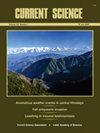Imprints of vehicular pollution in roadside dust from Kolkata, India: insights from magnetic susceptibility, geo-statistical and SEM studies
IF 1
4区 综合性期刊
Q3 MULTIDISCIPLINARY SCIENCES
引用次数: 1
Abstract
The present study aimed to determine the magnetic susceptibility of roadside dust collected from different parts of Kolkata city, West Bengal, India. The average value of susceptibility was 4.96 × 10 –6 m 3 /kg, the highest being 19.6 × 10 –6 m 3 /kg and the lowest being 1.2 × 10 –6 m 3 /kg. The frequency-dependent susceptibility value (average = 2.19) indicated the dominance of stable-single domain grains with a low concentration of superparamagnetic grains at a few locations. SEM analysis showed morphological diversity of road dust – irregular, aggregate, angular and cloudy. Energy dispersive X-ray spectroscopy analysis of the dust particles revealed that Ca-rich, Na-rich and Fe-rich particles were abundant. Compositions were variable with the morphology. The mapping of magnetic susceptibility indicated that the susceptibility values were higher in areas with heavy vehicular traffic and other polluting sources. However, some areas with high pollution had open spaces, indicating the dispersion of magnetic pollutants. The study indicated the degradation of the environment due to anthropogenic activities.来自印度加尔各答的路边灰尘中车辆污染的印记:来自磁化率、地质统计和扫描电镜研究的见解
本研究旨在测定从印度西孟加拉邦加尔各答市不同地区收集的路边粉尘的磁化率。敏感性平均值为4.96 × 10 -6 m3 /kg,最高为19.6 × 10 -6 m3 /kg,最低为1.2 × 10 -6 m3 /kg。磁化率随频率变化的平均值为2.19,表明稳定的单畴晶粒占主导地位,少数位置有低浓度的超顺磁晶粒。扫描电镜分析表明,道路粉尘形态多样,有不规则的、聚集的、角状的和多云的。对尘埃颗粒的能量色散x射线光谱分析表明,尘埃颗粒中含有丰富的富ca、富na和富fe颗粒。成分随形态变化而变化。磁化率图显示,车辆较多的地区和其他污染源较多的地区磁化率较高。然而,一些高污染地区有开放空间,表明磁性污染物的分散。研究表明,由于人类活动,环境正在退化。
本文章由计算机程序翻译,如有差异,请以英文原文为准。
求助全文
约1分钟内获得全文
求助全文
来源期刊

Current Science
综合性期刊-综合性期刊
CiteScore
1.50
自引率
10.00%
发文量
97
审稿时长
3 months
期刊介绍:
Current Science, published every fortnight by the Association, in collaboration with the Indian Academy of Sciences, is the leading interdisciplinary science journal from India. It was started in 1932 by the then stalwarts of Indian science such as CV Raman, Birbal Sahni, Meghnad Saha, Martin Foster and S.S. Bhatnagar. In 2011, the journal completed one hundred volumes. The journal is intended as a medium for communication and discussion of important issues that concern science and scientific activities. Besides full length research articles and shorter research communications, the journal publishes review articles, scientific correspondence and commentaries, news and views, comments on recently published research papers, opinions on scientific activity, articles on universities, Indian laboratories and institutions, interviews with scientists, personal information, book reviews, etc. It is also a forum to discuss issues and problems faced by science and scientists and an effective medium of interaction among scientists in the country and abroad. Current Science is read by a large community of scientists and the circulation has been continuously going up.
Current Science publishes special sections on diverse and topical themes of interest and this has served as a platform for the scientific fraternity to get their work acknowledged and highlighted. Some of the special sections that have been well received in the recent past include remote sensing, waves and symmetry, seismology in India, nanomaterials, AIDS, Alzheimer''s disease, molecular biology of ageing, cancer, cardiovascular diseases, Indian monsoon, water, transport, and mountain weather forecasting in India, to name a few. Contributions to these special issues ‘which receive widespread attention’ are from leading scientists in India and abroad.
 求助内容:
求助内容: 应助结果提醒方式:
应助结果提醒方式:


